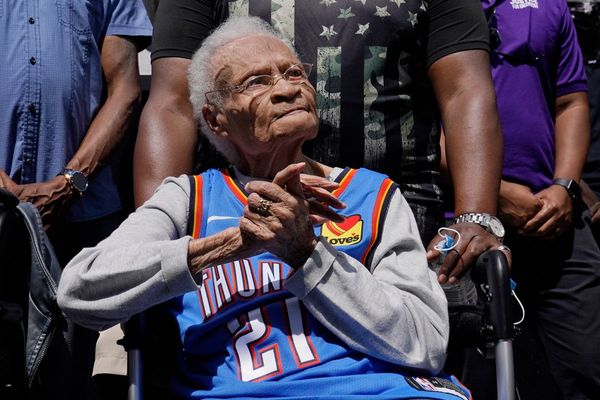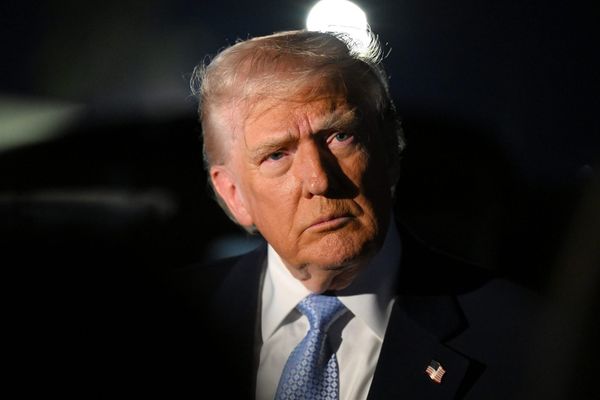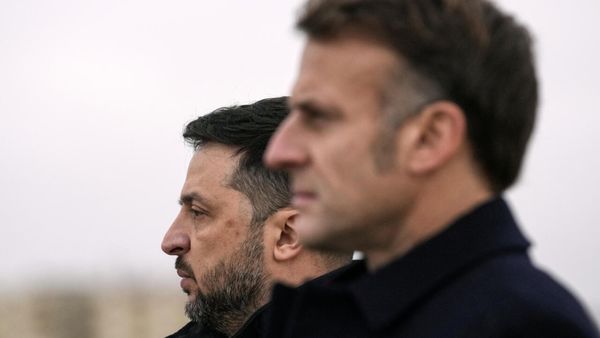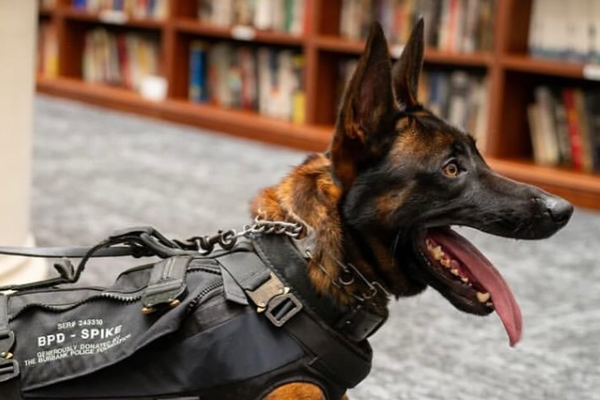
Russia launches deadly strikes on Kyiv amid new US-brokered peace talks
in Kyiv
Four people were killed and three injured at one site in Kyiv’s Sviatoshynskyi district in the west, and two people were killed and five injured in the Dniprovskyi district. There were 13 separate reports of attack damage or falling debris including to a 22-storey residential apartment block.
Liubov Petrivna, a 90-year-old resident of a damaged building in the Dniprovskyi district, said “absolutely everything” in her apartment had been shattered by the strike and “glass rained down” on her.
Petrivna told Associated Press she did not believe in the peace plan under discussion: “No one will ever do anything about it. Putin won’t stop until he finishes us off.”
Explosions were heard in two waves in the capital, first shortly after 1am, and again at about 7am, and also in the Dnipro, Kharkiv, Chernihiv and Cherkasy regions in a wide-ranging assault against the country’s already battered infrastructure.
Emergency power outages to Kyiv’s already disrupted service were announced by the Ukrenergo electricity generator, while heat supply was also affected in large parts of the capital on Tuesday morning as the city began a clear-up process.
“The Russians are deliberately targeting civilian infrastructure and housing. Cynical terror,” Tymur Tkachenko, the head of the military administration for the capital, said on Telegram.
Updated
Coalition of the Willing to meet this afternoon
Separately to the US-led talks in Abu Dhabi, the so-called “Coalition of the Willing” will also meet virtually today to talk about its next steps.
The call, bringing together some 30 countries, is expected in the afternoon.
Zelenskyy could see Trump in US 'at earliest suitable date in November' to finalise talks, Ukraine's national security council chief says
Rustem Umerov, Secretary of the National Security and Defence Council of Ukraine and the country’s former defence minister, said the US and Ukrainian delegations “reached a common understanding on the core terms of the agreement discussed in Geneva,” hailing “productive and constructive” meetings with US counterparts.
Seemingly keen to progress the talks on the revised terms further, he said:
“We look forward to organising a visit of Ukraine’s President to the US at the earliest suitable date in November to complete final steps and make a deal with President Trump.”
But this may not be that simple as Russia is yet to indicate its support for the revised proposals, somewhat complicating the path for the deal to be agreed.
Updated
Driscoll's unexpected role in Ukraine talks suggest resurgence of isolationist vice-president Vance
in Washington
The US army secretary, Daniel Driscoll, was an unlikely envoy for the Trump administration’s newest proposal to end the Russian invasion of Ukraine – but his ties to JD Vance have put a close ally of the Eurosceptic vice-president on the frontlines of Donald Trump’s latest push to end the war.
Before his trip to Kyiv last week, Driscoll was not known for his role as a negotiator or statesman, and his early efforts at selling the deal to European policymakers were described as turbulent.
His close ties to Vance, with whom he studied at Yale and shares a close friendship, indicate the resurgence of the isolationist vice-president in negotiations to end the Ukraine crisis.
It was Vance who stepped in during Volodymyr Zelenskyy’s disastrous first trip to the Trump White House in March and demanded he show Trump more “respect” – now Ukraine is once again resisting pressure from the US to cut a quick deal that local officials have described as a “capitulation”.
Dan Driscoll is the unlikely point man for the Ukraine peace deal
in Washington
Little in Dan Driscoll’s résumé – past or present – suggests he has the qualifications to understand the often-tortured and bloody history of relations between Russia and Ukraine.
A former investment banker with a degree in business administration, the current US army secretary’s main calling card for a prominent role in the Trump administration may be a friendship with JD Vance dating from when they were at Yale Law School together.
Against that thin backdrop, Driscoll now finds himself in the unlikely role of US point man between Kyiv and Moscow as Donald Trump seeks to live up to his promise to end the near four-year war between the two countries, something he once promised to do on “day one” of his presidency.
Previously seen by the president as the “drone guy” due to his interest in state-of-the-art technology, the army chief – not yet 40 – found himself on Thursday delivering a 28-point White House peace plan to Zelenskyy that Ukrainians and their European allies have denounced as a “capitulation” that effectively rewards Moscow for its aggression.
Diplomatic neophyte that he may be, Driscoll’s advocates argue that his rise is due to more than just the default of others.
Since being sworn in on 25 February, he is said to have impressed White House insiders as one of the administration’s most skillful performers.
As army secretary, he is tasked with the unglamorous job of managing the budget and overseeing its 1 million-plus strong workforce of active duty personnel, national guard and reserve soldiers, as well as about 265,000 civilian employees.
Disarray over leaked US-Russia peace plan is ideal scenario for Putin
Russian affairs reporter
The Kremlin has barely lifted a finger in recent days. It hasn’t needed to.
The 28-point US-Russia peace proposal, leaked to the media last week, has thrown Washington, Kyiv and European capitals into disarray, creating precisely the conditions Vladimir Putin has long sought: a negotiating table sharply tilted in the Russian president’s favour, with Ukraine cornered into weighing terms it cannot accept and the threat of losing its most important ally hanging over its head.
The structure of the US negotiation process works to Russia’s advantage.
Washington wants Kyiv to approve the plan before a US delegation travels to Moscow to finalise terms.
The Kremlin believes any move by Zelenskyy to accept something close to the 28-point draft would trigger political turmoil in Ukraine – an outcome Moscow would welcome.
And Putin knows Ukraine cannot simply abandon the talks: it remains reliant on US-supplied weapons and intelligence and could face a catastrophic winter if its central ally walked away.
Putin is unlikely to retreat from his main goal of subjugating Ukraine and will instead push for a revised version of the current plan that more fully reflects Russia’s interests.
Morning opening: Secretive talks in Abu Dhabi
The US army secretary Daniel Driscoll is reportedly meeting with Russian and Ukrainian officials for talks in Abu Dhabi today in another attempt to bridge the gap between the original US peace plan, informed by Russian demands, and the Ukrainian response, backed by Europe.
Driscoll has already met with the Russians on Monday night, FT reported (£), although there was no official confirmation of the discussions. Kremlin spokesperson Dmitry Peskov declined to comment on the meeting, saying he had “nothing to say” about the talks.
It is not immediately clear who takes part in both delegations, but media reports suggest that Ukraine will be represented by Kyrylo Budanov, the chief of the Ukrainian defence ministry’s Main Intelligence Directorate (GUR).
The meetings come after Geneva talks over the weekend, with Ukraine pushing back against some of the maximalist demands put forward by Russia.
But, despite the diplomatic efforts, Russia continues its attacks on Ukraine, with another wave of strikes overnight killing at least six and injuring 13 people.
Its attack on the capital, Kyiv, knocked out water, electricity, and heat in parts of the city, it was reported, with further damage also recorded to Ukraine’s energy infrastructure.
The French president Emmanuel Macron has warned this morning against a deal ending the Russian invasion of Ukraine that would amount to a “capitulation” by Kyiv, stressing it would “give Russia all the freedom to go further, including to other European [countries] and put everyone’s security in danger.”
In an interview with RTL radio, Macron said that any peace deal would have to be strong enough to hold and prevent Russia from re-invading Ukraine “six months, eight months later, two years later.”
I will bring you all the key updates throughout the day.
It’s Tuesday, 25 November 2025, it’s Jakub Krupa here, and this is Europe Live.
Good morning.







